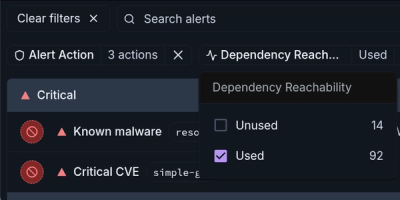
Product
Introducing Historical Analytics – Now in Beta
We’re excited to announce a powerful new capability in Socket: historical data and enhanced analytics.
fluent-plugin-rename-key
Advanced tools
This manual is for ~> 0.4.0, which uses fluentd v0.14 API. For earlier version please see here.
This plugin renames or replace portion of keys by regular expressions, assign new tags, and re-emits.
It was created to work around the [field name restrictions](http://docs.mongodb.org/manual/reference/limits/#Restrictions on Field Names) of MongoDB BSON document. Also see MongoDB Document Types for more information.
For Fluentd earlier than v0.14.0, please use the earlier version 0.3.4.
| fluent-plugin-rename-key | Fluentd | ruby |
|---|---|---|
| ~> 0.3.4 | >= v0.12.0 | >= 1.9 |
| ~> 0.4.0 | >= v0.14.0 | >= 2.1 |
See [Fluentd Installation Guide] (http://docs.fluentd.org/v0.12/categories/installation)
# <num> is an integer for ordering rules, rules are checked in ascending order. Only the first match is applied.
# <key_regexp> is the regular expression to match keys, ' '(whitespace) is not allowed, use '\s' instead.
# <new_key> is the new key name pattern, MatchData placeholder '${md[1]}' and whitespace are allowed.
rename_rule<num> <key_regexp> <new_key>
# <num> is an integer for ordering rules, rules are checked in ascending order. Only the first match is applied.
# <key_regexp> is the regular expression to match keys, ' '(whitespace) is not allowed, use '\s' instead.
# <new_key> is the pattern to replace the matches with, MatchData placeholder '${md[1]}' and whitespace are allowed.
# This field is optional, if missing the matches will be replaced with ''(empty string).
replace_rule<num> <key_regexp> <new_key>
# Optional: dig into the hash structure and rename every matched key, or stop at the first level,
# default is "true"
deep_rename <bool>
# Optional: remove tag prefix. This is only for <match>
remove_tag_prefix <string>
# Optional: append additional name to the original tag, default is 'key_renamed'. This is only for <match>
append_tag <string>
Take this record as example: '$url' => 'www.google.com', 'level2' => {'$1' => 'option1'}.
To save it to MongoDB, we can use the following config to replace the keys starting with dollar sign.
For Fluentd v0.14 or later, use rename_key filter:
# At rename_rule1, it matches the key starting the '$', say '$url',
# and puts the following characters into match group 1.
# Then uses the content in match group 1, ${md[1]} = 'url', to generate the new key name 'x$url'.
<filter input.test>
@type rename_key
rename_rule1 ^\$(.+) x$${md[1]}
rename_rule2 ^l(.{3})l(\d+) ${md[1]}_${md[2]}
</match>
The result is 'x$url' => 'www.google.com', 'eve_2' => {'x$1' => 'option1'}.
This plugin uses String#match to match keys to be replaced. It is possible to reference the resulting MatchData in new key names. For example, ${md[0]} is the matched string, ${md[1]} is match group 1, and so on.
Note: This is done by matching ${md[0]} string pattern, so array operations such as range ${md[0..2]} is not supported.
This plugin initially resembled the implementation of fluent-plugin-rewrite-tag-filter.
Copyright : Copyright (c) 2013- Shunwen Hsiao (@hswtw) License : Apache License, Version 2.0
FAQs
Unknown package
We found that fluent-plugin-rename-key demonstrated a not healthy version release cadence and project activity because the last version was released a year ago. It has 3 open source maintainers collaborating on the project.
Did you know?

Socket for GitHub automatically highlights issues in each pull request and monitors the health of all your open source dependencies. Discover the contents of your packages and block harmful activity before you install or update your dependencies.

Product
We’re excited to announce a powerful new capability in Socket: historical data and enhanced analytics.

Product
Module Reachability filters out unreachable CVEs so you can focus on vulnerabilities that actually matter to your application.

Company News
Socket is bringing best-in-class reachability analysis into the platform — cutting false positives, accelerating triage, and cementing our place as the leader in software supply chain security.